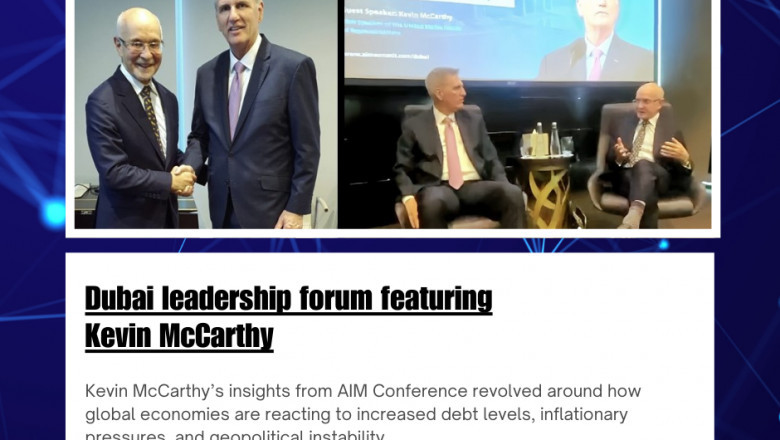views
In a time of rising debt, market uncertainty, and political division, global leaders are seeking direction. The AIM Summit Dubai roundtable with Kevin McCarthy offered just that — a sharp, solutions-oriented dialogue on the intersection of politics, economics, and international leadership. Former U.S. Speaker Kevin McCarthy’s global sovereign debt insights were among the most anticipated at the summit, setting the tone for discussions on how to navigate today’s complex challenges.
Sovereign Debt at AIM Summit Dubai: A Global Wake-Up Call
At the heart of McCarthy’s talk was the pressing issue of sovereign debt. In the session titled Sovereign Debt at AIM Summit Dubai, he raised alarms about the unsustainable debt levels facing both developed and emerging economies. Citing the U.S., Japan, and several EU nations, he pointed out that high debt-to-GDP ratios are compromising fiscal autonomy and heightening default risks.
McCarthy emphasized the need for global coordination and institutional reform to ensure debt sustainability. Countries, he noted, must implement medium- and long-term strategies to balance budgets without stifling growth.
Global Economic Insights by Kevin McCarthy: Resilience Over Panic
During the keynote, global economic insights by Kevin McCarthy covered a wide range of topics — from inflation and interest rate cycles to the shifting geopolitical power dynamics. He highlighted how economic decisions in one part of the world ripple across borders, making collaboration more important than ever.
“Markets are interlinked. Political chaos in one region can fuel inflation in another. We need a new global compact to deal with shared vulnerabilities,” he stated during the panel.
Kevin McCarthy Roundtable on Global Economy: Bridging Politics and Policy
The Kevin McCarthy roundtable on global economy brought together thought leaders and policymakers to discuss fiscal governance, private sector innovation, and policy continuity. McCarthy emphasized the importance of regulatory consistency to inspire long-term investment.
He also spoke about energy transitions, stressing that nations must adopt flexible energy strategies that promote growth while meeting sustainability goals. “Clean energy is the future, but abrupt policy shifts scare away investors,” McCarthy warned.
Emerging Market Trends at AIM Summit: Opportunities and Caution
The emerging market trends at AIM Summit session revealed a mixed outlook. On one hand, emerging markets are showing rapid tech adoption and urbanization. On the other, they face volatile currency movements and governance concerns.
Kevin McCarthy argued that, despite risks, these markets will be pivotal in the next global growth cycle. But to attract capital, they need to ensure transparency, reduce corruption, and maintain fiscal discipline.
Kevin McCarthy on Emerging Market Volatility: A Cautionary Tale
In his detailed analysis titled Kevin McCarthy on emerging market volatility, McCarthy recounted historical downturns and currency crises in Latin America, Asia, and Africa. He explained that while emerging markets offer high returns, they are also prone to sharp downturns.
He called for more robust regional financial safety nets and IMF-led training programs to equip emerging economies with better crisis management tools.
Political Polarization in Western Democracies: Kevin McCarthy’s Take
Another major concern was the political polarization in Western democracies Kevin McCarthy addressed candidly. He explained how rising division in political systems — especially in the U.S. and parts of Europe — is making long-term economic planning increasingly difficult.
He criticized short-termism and called on politicians across the spectrum to prioritize stability over ideology. “You can’t run an economy on election cycles. You need a generational mindset,” he emphasized.
Kevin McCarthy on Cross-Party Collaboration: Policy Over Politics
During the session Kevin McCarthy on cross-party collaboration, he reflected on his time as U.S. Speaker and how bipartisan cooperation is no longer optional — it’s essential. He argued that solving complex issues like sovereign debt or climate resilience demands unified policy approaches.
Cross-party collaboration, he said, is not about agreeing on everything but about agreeing on what matters most for national and global stability.
Dubai Leadership Forum Featuring Kevin McCarthy: A Global Stage for Solutions
The Dubai leadership forum featuring Kevin McCarthy was more than a talk; it was a call to action. Leaders from the Gulf, Asia, Europe, and the U.S. engaged in high-level discussions around trade, innovation, and policy evolution. Dubai, with its strategic location and neutral positioning, served as the perfect host for these global dialogues.
McCarthy praised the UAE’s role in facilitating balanced international discussions and called for more such forums to bridge East-West divides.
Kevin McCarthy Geopolitical Trends Dubai: A Shift in Global Power
In the Kevin McCarthy geopolitical trends Dubai session, he noted that global power is shifting from West to East. With China increasing its global presence, the Gulf becoming a financial hub, and Asia leading in tech, the U.S. and EU must rethink their strategies.
McCarthy emphasized the need for new diplomatic partnerships and trade agreements that reflect current realities. “It’s not about dominance anymore; it’s about collaboration,” he said.
Kevin McCarthy Insights from AIM Conference: A Blueprint for Economic Leadership
The closing remarks from McCarthy summarized the Kevin McCarthy insights from AIM Conference. His message: economic leadership in the 21st century must be rooted in fiscal responsibility, political cooperation, and global vision.
He urged countries to move away from isolationist policies and invest in multilateralism, innovation, and youth development.
Conclusion: The Future Starts with Dialogue
The AIM Summit Dubai roundtable with Kevin McCarthy proved to be a landmark event for global economic discourse. As the world stands at the intersection of crisis and opportunity, McCarthy’s insights serve as both a warning and a guide.
With sovereign debt rising, political division deepening, and markets shifting, the time for unified global leadership is now. The future of economic stability — and prosperity — depends on it.














Comments
0 comment